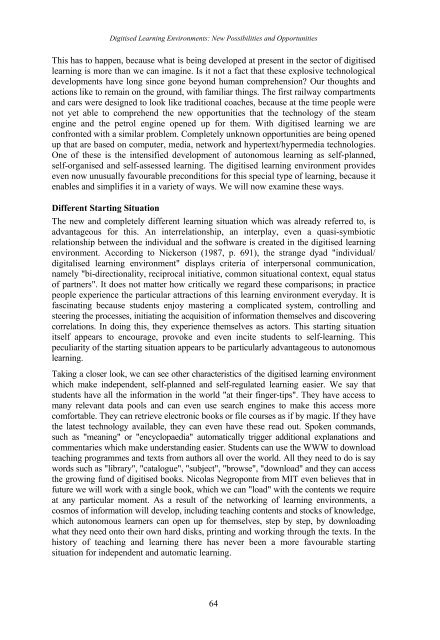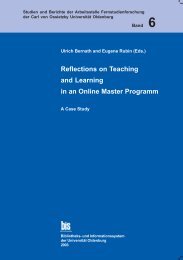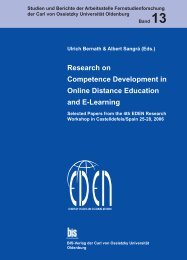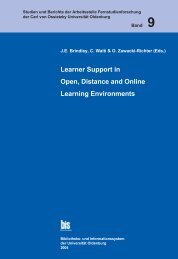Distance Education in Transition - Master of Distance Education ...
Distance Education in Transition - Master of Distance Education ...
Distance Education in Transition - Master of Distance Education ...
Create successful ePaper yourself
Turn your PDF publications into a flip-book with our unique Google optimized e-Paper software.
Digitised Learn<strong>in</strong>g Environments: New Possibilities and Opportunities<br />
This has to happen, because what is be<strong>in</strong>g developed at present <strong>in</strong> the sector <strong>of</strong> digitised<br />
learn<strong>in</strong>g is more than we can imag<strong>in</strong>e. Is it not a fact that these explosive technological<br />
developments have long s<strong>in</strong>ce gone beyond human comprehension? Our thoughts and<br />
actions like to rema<strong>in</strong> on the ground, with familiar th<strong>in</strong>gs. The first railway compartments<br />
and cars were designed to look like traditional coaches, because at the time people were<br />
not yet able to comprehend the new opportunities that the technology <strong>of</strong> the steam<br />
eng<strong>in</strong>e and the petrol eng<strong>in</strong>e opened up for them. With digitised learn<strong>in</strong>g we are<br />
confronted with a similar problem. Completely unknown opportunities are be<strong>in</strong>g opened<br />
up that are based on computer, media, network and hypertext/hypermedia technologies.<br />
One <strong>of</strong> these is the <strong>in</strong>tensified development <strong>of</strong> autonomous learn<strong>in</strong>g as self-planned,<br />
self-organised and self-assessed learn<strong>in</strong>g. The digitised learn<strong>in</strong>g environment provides<br />
even now unusually favourable preconditions for this special type <strong>of</strong> learn<strong>in</strong>g, because it<br />
enables and simplifies it <strong>in</strong> a variety <strong>of</strong> ways. We will now exam<strong>in</strong>e these ways.<br />
Different Start<strong>in</strong>g Situation<br />
The new and completely different learn<strong>in</strong>g situation which was already referred to, is<br />
advantageous for this. An <strong>in</strong>terrelationship, an <strong>in</strong>terplay, even a quasi-symbiotic<br />
relationship between the <strong>in</strong>dividual and the s<strong>of</strong>tware is created <strong>in</strong> the digitised learn<strong>in</strong>g<br />
environment. Accord<strong>in</strong>g to Nickerson (1987, p. 691), the strange dyad "<strong>in</strong>dividual/<br />
digitalised learn<strong>in</strong>g environment" displays criteria <strong>of</strong> <strong>in</strong>terpersonal communication,<br />
namely "bi-directionality, reciprocal <strong>in</strong>itiative, common situational context, equal status<br />
<strong>of</strong> partners". It does not matter how critically we regard these comparisons; <strong>in</strong> practice<br />
people experience the particular attractions <strong>of</strong> this learn<strong>in</strong>g environment everyday. It is<br />
fasc<strong>in</strong>at<strong>in</strong>g because students enjoy master<strong>in</strong>g a complicated system, controll<strong>in</strong>g and<br />
steer<strong>in</strong>g the processes, <strong>in</strong>itiat<strong>in</strong>g the acquisition <strong>of</strong> <strong>in</strong>formation themselves and discover<strong>in</strong>g<br />
correlations. In do<strong>in</strong>g this, they experience themselves as actors. This start<strong>in</strong>g situation<br />
itself appears to encourage, provoke and even <strong>in</strong>cite students to self-learn<strong>in</strong>g. This<br />
peculiarity <strong>of</strong> the start<strong>in</strong>g situation appears to be particularly advantageous to autonomous<br />
learn<strong>in</strong>g.<br />
Tak<strong>in</strong>g a closer look, we can see other characteristics <strong>of</strong> the digitised learn<strong>in</strong>g environment<br />
which make <strong>in</strong>dependent, self-planned and self-regulated learn<strong>in</strong>g easier. We say that<br />
students have all the <strong>in</strong>formation <strong>in</strong> the world "at their f<strong>in</strong>ger-tips". They have access to<br />
many relevant data pools and can even use search eng<strong>in</strong>es to make this access more<br />
comfortable. They can retrieve electronic books or file courses as if by magic. If they have<br />
the latest technology available, they can even have these read out. Spoken commands,<br />
such as "mean<strong>in</strong>g" or "encyclopaedia" automatically trigger additional explanations and<br />
commentaries which make understand<strong>in</strong>g easier. Students can use the WWW to download<br />
teach<strong>in</strong>g programmes and texts from authors all over the world. All they need to do is say<br />
words such as "library", "catalogue", "subject", "browse", "download" and they can access<br />
the grow<strong>in</strong>g fund <strong>of</strong> digitised books. Nicolas Negroponte from MIT even believes that <strong>in</strong><br />
future we will work with a s<strong>in</strong>gle book, which we can "load" with the contents we require<br />
at any particular moment. As a result <strong>of</strong> the network<strong>in</strong>g <strong>of</strong> learn<strong>in</strong>g environments, a<br />
cosmos <strong>of</strong> <strong>in</strong>formation will develop, <strong>in</strong>clud<strong>in</strong>g teach<strong>in</strong>g contents and stocks <strong>of</strong> knowledge,<br />
which autonomous learners can open up for themselves, step by step, by download<strong>in</strong>g<br />
what they need onto their own hard disks, pr<strong>in</strong>t<strong>in</strong>g and work<strong>in</strong>g through the texts. In the<br />
history <strong>of</strong> teach<strong>in</strong>g and learn<strong>in</strong>g there has never been a more favourable start<strong>in</strong>g<br />
situation for <strong>in</strong>dependent and automatic learn<strong>in</strong>g.<br />
64





